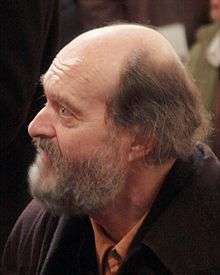Spiegel im Spiegel
| Spiegel im Spiegel | |
|---|---|
| Chamber music by Arvo Pärt | |
 The composer in 2008 | |
| Key | F major |
| Composed | 1978 |
| Scoring |
|
Spiegel im Spiegel (Mirror(s) in the mirror) is a composition by Arvo Pärt written in 1978, just before his departure from Estonia. The piece is in the tintinnabular style, wherein a melodic voice, operating over diatonic scales, and tintinnabular voice, operating within a triad on the tonic, accompany each other. It is about ten minutes long.
Description
The piece was originally written for a single piano and violin – though the violin has often been replaced with either a cello or a viola. Versions also exist for double bass, clarinet, horn, flugelhorn, flute, oboe, bassoon, trombone, and percussion. The piece is an example of minimal music.
The piece is in F major in 6/4 time, with the piano playing rising crotchet triads and the second instrument playing slow F major scales, alternately rising and falling, of increasing length, which all end on the note A (the mediant of F). The piano's left hand also plays notes, synchronised with the violin (or other instrument).
"Spiegel im Spiegel" in German literally can mean both "mirror in the mirror" as well as "mirrors in the mirror", referring to an infinity mirror, which produces an infinity of images reflected by parallel plane mirrors: the tonic triads are endlessly repeated with small variations as if reflected back and forth. The structure of melody is made by couple of phrases characterized by the alternation between ascending and descending movement with the fulcrum on the note A. This, with also the overturning of the final intervals between adjacent phrases (for example, ascending sixth in the question - descending sixth in the answer), contribute to give the impression of a figure reflecting on a mirror and walking back and towards it.
In 2011, the piece was the focus of a half-hour BBC Radio 4 programme, Soul Music, which examined pieces of music "with a powerful emotional impact". Violinist Tasmin Little discussed her relationship to the piece.[1][2]
Adaptation
The piece has been used in television, film and theatre including:
Film
Dance
- David Nixon's Dracula performed by the Northern Ballet (UK, 2009)
- Pilobolus' Rushes in a scene choreographed using chairs. (US, 2007)
- Christopher Wheeldon's 2005 ballet After the Rain, part two (Pärt's "Tabula Rasa" is the score to part one)
- John Neumeier's ballet Othello (1985), the central pas de deux (Pärt's "Tabula Rasa" is the score to part two)
- Mats Ek's Smoke performed by Sylvie Guillem and Niklas Ek (1995)
- Stephen Mills' Desire performed by Ballet Austin (1998)
Theatre
- The New York production of Eurydice, a play by Sarah Ruhl (2007)
- Venezuelan production called 120 vidas x minuto ("120 Lives a Minute"), a play by Gustavo Ott (2007)
- Czech production of Forgotten Light ("Zapomenuté světlo"), a play by Jakub Deml
- French production of The Glass Menagerie (Tennessee Williams) a play by Daniel Jeanneteau (2016)[3]
- Canadian production of "Othello", a play by Shakespeare, directed by Ian Farthing at the St. Lawrence Shakespeare Festival (2012)
Television
- The BBC documentary Touched by Auschwitz (2015)
- The BBC drama Hattie (2011)
- The RTS (Radio and Television of Serbia) and Colossal production documentary "Izgubljeni orden" (The lost Medal) (2010)
- The BBC television series Criminal Justice (2009)
- It was also used in a 2008 episode of the British medical drama Casualty, when character Dr. Ruth Winters attempted suicide, and again in January 2010 when Dr. Adam Trueman's son, Harry Trueman, dies after a car accident. It was reused in their spin-off show Holby City in December 2016 when Jac Naylor was being operated on as a result of her ovarian cyst rupturing.
- The season two episode of Supernatural entitled "What is and What Should Never Be" (2007)
- The BBC dramatisation of Elizabeth Gaskell's 'North & South' (2004) – theme for the romantic railway station closing-scene
- The BBC documentary Century of the Self (2002) by Adam Curtis
- The BBC documentary John Steinbeck: Voice of America (2011) by Melvyn Bragg
- The FOX television show Simpsons episode 534 Yolo (2013)
- The RTÉ News, on New Year's Eve, at the end of news editions as a memoriam to victims of road traffic deaths during the year
- The Carlton series "The Wrong Side of the Rainbow" (2001)
- The S4C television drama "Gwaith Cartref" (2015).
Sport
- U.S. ice dancers Maia Shibutani and Alex Shibutani in their free dance titled Evolution for the season 2016-17.
Availability
Pärt himself endorsed a recording on the ECM New Series album entitled Alina, recorded in July 1995 and released in 1999. It includes two variations of Für Alina by pianist Alexander Malter, and three versions of Pärt’s Spiegel im Spiegel (for piano and violin, violoncello, and violin, respectively). According to the liner notes, the two versions, somewhat like “mood improvisations”, were handpicked by Pärt from a recording that was originally several hours long. The two versions most strikingly differ in the use of rubato and that of the use of the low octave b. Both versions clock slightly under eleven minutes.
The piece is featured on the 2016 album Sacred by Australian violinist Niki Vasilakis and features Deanna Djuric on piano.